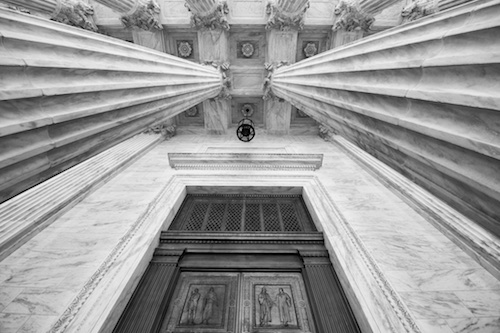BakerHostetler
In Dewberry Group, Inc. v. Dewberry Engineers, Inc.,[1] the Supreme Court unanimously held that the Lanham Act does not permit courts to disregard corporate identity when awarding damages for trademark infringement.
Section 35 of the Lanham Act allows a plaintiff to recover “‘the defendant’s profits’ deriving from a trademark violation” and grants the court discretion to assess such profits “according to the circumstances of the case.”[2] The remedy of disgorgement of profits aims to “prevent unjust enrichment and remove economic incentives out of trademark infringement.”[3] But whose profits can be disgorged after a court determines that disgorgement is an appropriate remedy?
In vacating the judgment of the lower court, the Court held that “the ‘defendant’s profits’ are the defendant’s profits, not its plus its affiliates’.” Op. The Court’s emphasis is in the original. Id. “By treating these entities as one and same, the courts below have approved an award that includes non-defendants profits–and therefore went further than the Lanham Act allows.” Dewberry Group and Dewberry Engineers are separate real estate companies that operate in Georgia. Virginia, Florida, and South Carolina. The Fourth Circuit Court of Appeals upheld this decision, noting that district courts have discretion when awarding disgorgement of profit. Admonishing a court for doing so “risks handing potential Although the affiliates were not defendants in the lawsuit and no attempt was made to pierce the corporate veil, the district court concluded that Dewberry Group and its affiliates operated under common ownership and treated them as a single corporation for damages purposes.
The Fourth Circuit Court of Appeals upheld this decision, noting that district courts have discretion when awarding disgorgement of profits and that admonishing a court for doing so “risks handing potential trademark infringers the blueprint for using corporate formalities to insulate their infringement from financial consequences.”[4] Judge A. Marvin Quattlebaum dissented, however, pointing out that there is no “loophole” that shields affiliates from the Lanham Act and “all Dewberry Engineers had to do was sue them.”
The Supreme Court relied on the plain language of the Lanham Act, which refers to the “defendant’s profits” — not the profits of nonparty corporate affiliates.[5]Determining that the lower courts “were wrong to treat Dewberry Group and its affiliates as a single entity in calculating the ‘defendant’s profits,'” Justice Elena Kagan, writing for the unanimous court, noted that “Dewberry Group is the sole defendant here, and under that language only its own profits are recoverable.” Op. The Court dismissed arguments by Dewberry Group that the lower courts’ decisions could be reconciled using a later sentence in the same section of statute: “If the court shall find that recovery based on The Court dismissed arguments from Dewberry Group that lower court decisions could be reconciled by using a later sentence of the same statute: “If a court finds that the amount of recovery based on The Court dismissed arguments by Dewberry Group that the lower courts’ decisions could be reconciled using a later sentence in the same section of the statute: “If a court finds that based on The Court noted that neither the lower courts nor the Court itself relied on the “just-sum’ provision. Op. at 7.[6]
The Court left three questions unaddressed, namely, the proper application of the just-sum provision, whether and when courts could look behind a defendant’s tax or accounting records to determine the defendant’s actual financial gain, and whether corporate veil-piercing is available under the Lanham Act damages provision.
Justice Sonia Sotomayor, concurring, identified several situations in which courts might take into account “economic realities,” including the anticipatory assignment of profit to affiliates and monies indirectly earned while balancing deficits caused by under-market rates to affiliates. Concurr. Concurr. 23-900, at 3 (Feb. 26 2025).[,] SS 1117(a).
Dewberry Eng’rs, Inc. v. Dewberry Grp., Inc., no. 1:20-cv-00610, 2022 WL 1439826, at *9 (E.D. Va. Mar. 2, 2022) (quoting Am. Rice, Inc. v. Producers Rice Mill, Inc., 518 F.3d 321, 340 (5th Cir. Dewberry Eng’rs, Inc., v. Dewberry Grp., Inc., no. 1:20-cv-01610, 2021 Wl 5217016(E.D. Va. Aug. 11, 2011. Dewberry Eng’rs, Inc. 1:20-cv-01610, 2022 WL 143982 (E.D. Va. Mar. Dewberry Eng’rs, Inc., Inc. Dewberry Grp., Inc., 4th Cir. 2023).
Id. at 299 (Quattlebaum, J., dissenting).






